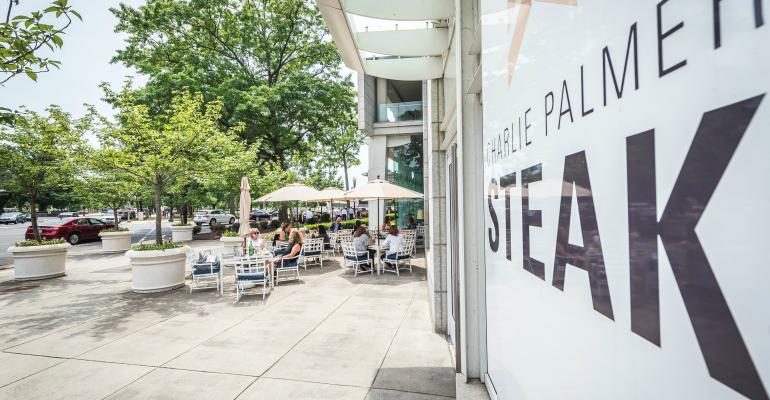Charlie Palmer has spent much of his career expanding his award-winning restaurants and boutique hotels throughout top destination markets like New York City and Las Vegas. Needless to say, his Charlie Palmer Collective took quite a hit during the throes of the pandemic in 2020 and 2021.
Now, the company – which includes 17 concepts and growing – is more than 90% recovered, according to President Courtland Palmer, Charlie's son. Palmer, who has a background in banking, came on board in 2020 with an objective of restructuring the organization and renegotiating with its landlords and hotel partners to best weather the storm.
The company, which now includes 24 corporate employees and over 600 restaurant employees, also put in new procedures and training programs and shifted its strategy to focus more on mentorship and morale. This, Palmer said, has been the biggest driver of the company’s continued recovery.
One of the biggest pieces of this strategy is a new program called “catching people doing something right,” encouraging leadership to praise employees whenever applicable. It is a small and simple effort that creates major ripples, according to Palmer.
“A lot of time, leadership focuses on what needs to be corrected. We want leadership to take five seconds to praise someone for doing something right and those things really add up,” he said. “When we take the time to call out a positive review that specifically called out a server by name, for example, we’re establishing a culture of genuine hospitality experiences. Compensation isn’t the only motivator.”
Along these lines, the company rolled out the CPC Ambassador Program in 2020, which highlights employee success stories each month in the company’s newsletter and provides a bio about those employees. In addition to acknowledgment, they also receive a monetary bonus.
The company has also added goal setting to its employment process, and staff members receive formal performance evaluations to better understand if they’re on the path toward those goals. Those goals often include upward mobility within the company.
“Especially during the pandemic, we learned that it’s not always about the money but also how you feel in your position. We want to enhance how we develop employees and ideally put everyone on a growth plan,” Palmer said. “We don’t want our employees to feel transactional.”
Such feelings have created an industry-wide labor shortage throughout the past three years, including all-time-high quit rates. The leisure and hospitality industry remains about 500,000 workers short of pre-pandemic numbers, while other sectors have gained material numbers of workers. Palmer said his company has always had strong retention, but those retention and recruitment numbers have gotten better with the creation of these programs. The last several hires came from word-of-mouth, he adds.
Better retention has yielded a strong return on investment, not only because hiring and training new employees adds up, but also because experienced and happier employees treat the guests better, Palmer said.
“If we have a great staff and take care of them really well and spend more money and resources on them and build up their confidence, it has a net positive effect,” he said. “Plus, there’s the intangible effect on the guest. For us, that leads to better experiences and repeat business. Repeat business is one of our biggest drivers of revenue and profitability and a key component of sustaining profitability.”
Notably, employee programs to boost retention haven’t been the company’s only focus since the beginning of the pandemic. The Charlie Palmer Collective has also made several adjustments to its business model that have so far yielded positive results. In the company’s urban markets, for instance, restaurants have focused more on Tuesday, Wednesday and Thursday lunch hours and less on Mondays and Fridays, as they’ve seen a significant drop off of office foot traffic on those “shoulder days.” The company has also pushed its events business harder.
“We have started to replace some of that lost organic foot traffic on the ends of the week with corporate events, happy hours, eight-person get togethers from the office for some small bites and drinks,” Palmer said. “Not only has that helped us recapture some of the lunch business we lost, but it’s more profitable. Catering and events usually come with higher margins.”
There are also concept changes. For example, the collective’s newest restaurant, AperiBar, opened on Aug. 22 and is created to generate a “more approachable experience with a relaxed service model,” Palmer said, straying from the company’s signature white tablecloth model.
“This allows us to employ a different profile of front-of-house and back-of-house staff. It’s our youngest team and the service model allows employees to play different parts. We don’t need eight to 10 servers on the floor or a huge back of house to execute,” he said. “It’s a smaller staff and a smaller staff usually makes more money.”
Adjustments will continue throughout the company’s portfolio, as the consumer has changed. They’re more health and value conscious, for instance, and so some of the company’s signature steakhouses have started putting equal emphasis on offerings like salads and fish. Others have focused on a European-inspired shared plate/shared dining model.
“You might end up spending the same amount of money, but you’re doing so in a way that allows you to experience more of the menu and makes you feel like you get more for your dollar,” Palmer said. “We are making adjustments to fit the dynamic of who the customer is today, which is different than just a few years ago.”
Contact Alicia Kelso at [email protected]





